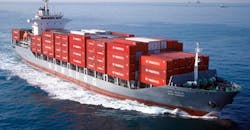With tariff increases delayed for the foreseeable future and the busy summer season approaching, imports at the nation’s major retail container ports are beginning to climb again, according to the monthly Global Port Tracker report released today by the National Retail Federation and Hackett Associates.
“Retailers are starting to stock up in anticipation of a strong summer,” NRF vice president for Supply Chain and Customs Policy Jonathan Gold said.
“Tariff increases are on hold and progress is being reported in talks between the United States and China, so the imports we’re seeing now are driven primarily by expectations for consumer demand.”
U.S. ports covered by Global Port Tracker handled 1.62 million Twenty-Foot Equivalent Units in February, the latest month for which after-the-fact numbers are available. That was down 14.3% from January and down 4% year-over-year.
February is traditionally the slowest month of the year because of Lunar New Year factory shutdowns in Asia and the lull between retailers’ holiday and summer seasons.
March was estimated at 1.63 million TEU, up 5.9% year-over-year.
April is forecast at 1.75 million TEU, up 6.9%;
The upcoming forecast is as follows:
- May at 1.9 million TEU, up 4%
- June at 1.89 million TEU, up 2%
- July at 1.96 million TEU, up 2.9%
- August at 1.97 million TEU, up 4.3%. The August number would be the highest since the record 2 million TEU set last October as retailers brought holiday merchandise into the country ahead of expected tariff increases.
Imports during 2018 set a new record of 21.8 million TEU, an increase of 6.2% over 2017’s previous record of 20.5 million TEU. The first half of 2019 is expected to total 10.7 million TEU, up 3.7% over the first half of 2018.
“The U.S. consumer, while more cautious, has not stopped spending,” Hackett Associates Founder Ben Hackett said. “The inventory-to-sales ratio, however, is on the rise. Part of this can be attributed to the heavy front-loading of imports ahead of expected tariff increases that took place in 2018.”
U.S. tariffs of 10% on $200 billion worth of Chinese goods that took effect last September were scheduled to rise to 25% in March, but the increase was postponed by President Trump, citing progress in talks between Washington and Beijing. The tariff increase has been put on hold indefinitely while the negotiations continue.
